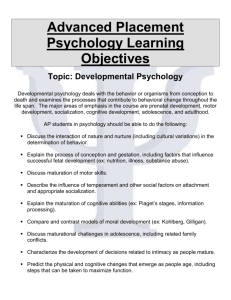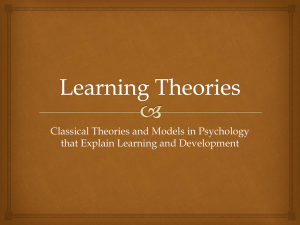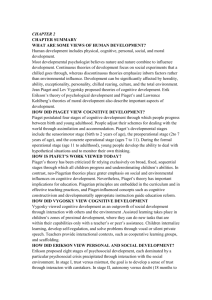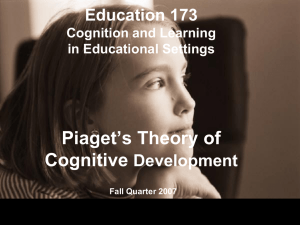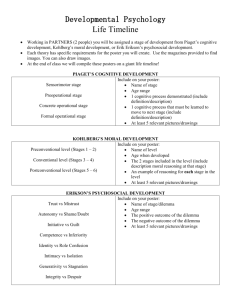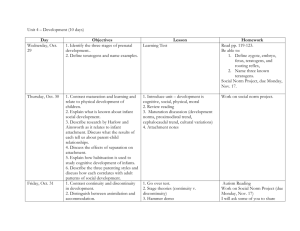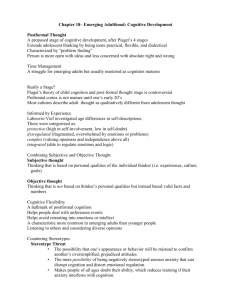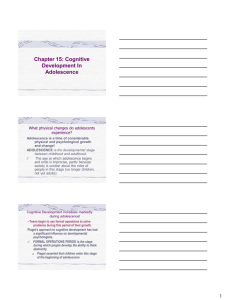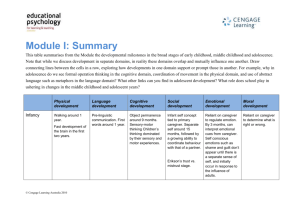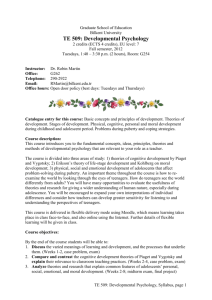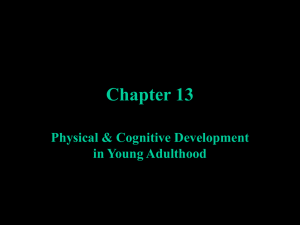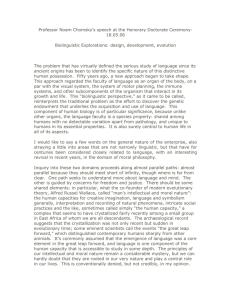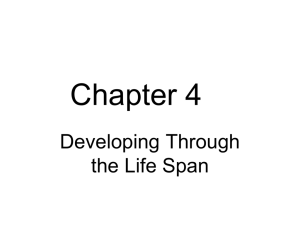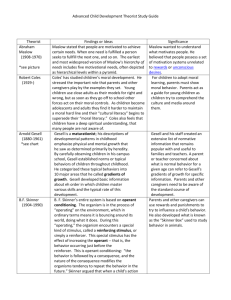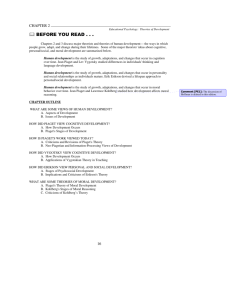Development Unit Plans
advertisement
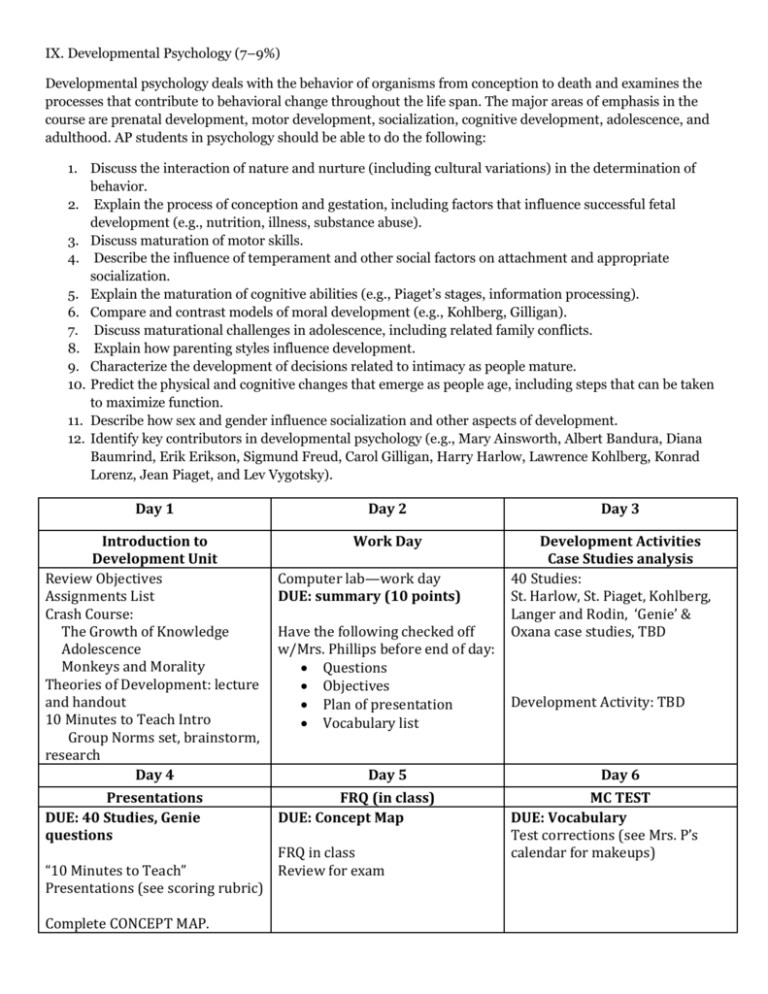
IX. Developmental Psychology (7–9%) Developmental psychology deals with the behavior of organisms from conception to death and examines the processes that contribute to behavioral change throughout the life span. The major areas of emphasis in the course are prenatal development, motor development, socialization, cognitive development, adolescence, and adulthood. AP students in psychology should be able to do the following: 1. Discuss the interaction of nature and nurture (including cultural variations) in the determination of behavior. 2. Explain the process of conception and gestation, including factors that influence successful fetal development (e.g., nutrition, illness, substance abuse). 3. Discuss maturation of motor skills. 4. Describe the influence of temperament and other social factors on attachment and appropriate socialization. 5. Explain the maturation of cognitive abilities (e.g., Piaget’s stages, information processing). 6. Compare and contrast models of moral development (e.g., Kohlberg, Gilligan). 7. Discuss maturational challenges in adolescence, including related family conflicts. 8. Explain how parenting styles influence development. 9. Characterize the development of decisions related to intimacy as people mature. 10. Predict the physical and cognitive changes that emerge as people age, including steps that can be taken to maximize function. 11. Describe how sex and gender influence socialization and other aspects of development. 12. Identify key contributors in developmental psychology (e.g., Mary Ainsworth, Albert Bandura, Diana Baumrind, Erik Erikson, Sigmund Freud, Carol Gilligan, Harry Harlow, Lawrence Kohlberg, Konrad Lorenz, Jean Piaget, and Lev Vygotsky). Day 1 Day 2 Introduction to Development Unit Review Objectives Assignments List Crash Course: The Growth of Knowledge Adolescence Monkeys and Morality Theories of Development: lecture and handout 10 Minutes to Teach Intro Group Norms set, brainstorm, research Day 4 Work Day Presentations DUE: 40 Studies, Genie questions “10 Minutes to Teach” Presentations (see scoring rubric) Complete CONCEPT MAP. Computer lab—work day DUE: summary (10 points) Have the following checked off w/Mrs. Phillips before end of day: Questions Objectives Plan of presentation Vocabulary list Day 5 FRQ (in class) DUE: Concept Map FRQ in class Review for exam Day 3 Development Activities Case Studies analysis 40 Studies: St. Harlow, St. Piaget, Kohlberg, Langer and Rodin, ‘Genie’ & Oxana case studies, TBD Development Activity: TBD Day 6 MC TEST DUE: Vocabulary Test corrections (see Mrs. P’s calendar for makeups) TASK: 10 MINUTES TO TEACH (DEVELOPMENT) 1. Learn about the concept (and sub-concepts) assigned to you. 2. Individually create a 1 page summary that proves understanding of the topic you’ve been assigned (due "day 2 of unit": 1/28-A, 1/29-B) 3. Identify which objectives t hat applies to your topic, list them in the box provided. 4. Create 1 Level 3 question pre objective 5. Identify all vocabulary that applies to your topic; integrate it into your 10 minute teaching time. 6. Create a 10 minute lesson w/in your group that will teach your classmates about the components of your topic, keeping in mind your objectives, theories/theorists. Ask yourself “will they be able to complete their concept map?” “will they have a deeper, psychological understanding of my topic through my lesson?” Grading Rubric Total /40 Written summary Objectives Leveled questions & vocabulary Presentation preparation (10) (5) (5) (5) 10 min of teaching: (extra credit will be given for any group that does NOT do a PowerPoint etc.) (15) Group Stage 1. Birth-2 List who is responsible for which subtopic in your group below. Physical: Norwood, Demps Cognitive: Moral: Social: Physical: Bleisner, Acuff, Geddy, Logan 2. 2-7 Cognitive: Moral: Social: Physical:Sabrina, Krizyanya, Aidan 3. 7-11 Cognitive: Moral: Social: Physical: Danielle, Mel, Lindsey 4. 11 & up Cognitive: Moral: Social: Physical: Conner, Bryce 5. Cognitive: Early adult (20- Moral: 39) Social: Physical: Diaz, Connor, Andrew, Tyler 6. Midlife (40-59) Cognitive: Moral: Social: Objectives Physical: Hannah, Sarina, Nathan 7. Old Age (60+) Cognitive: Moral: Social: Erikson: Cherelle, Alec, Marie, Zach 8. Theories and theorists Piaget: Kohlberg: Vygotsky: Freud (Psycho-sexual Theory of development): Grading Rubric Name Written summary Objectives Leveled questions & vocabulary Presentation preparation (10) (5) (5) (5) 10 min of teaching: (extra credit will be given for any group that does NOT do a PowerPoint prez) (15)
